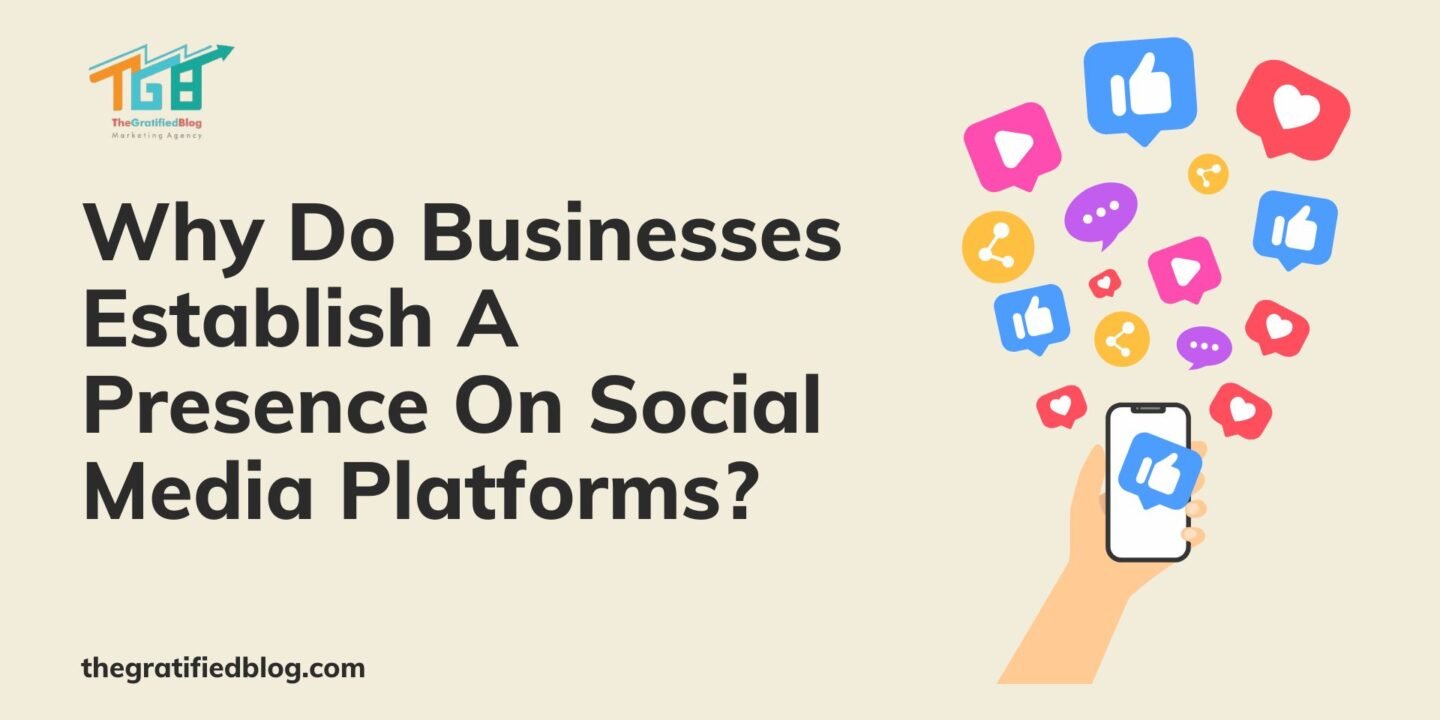
In today’s digital age, establishing a robust presence on social media platforms has become more than just a trend – it’s a fundamental strategy for businesses aiming to thrive in a changing market landscape. Social media offer unparalleled opportunities for businesses to connect with their target audience, build brand awareness, drive traffic, and ultimately, boost sales. In this blog post, “Why do businesses establish a presence on social media platforms?” we’ll explore why businesses leverage social media and its benefits to their operations.
What Is The Importance Of Social Media For Businesses?
Having a strong presence on social media is important for businesses in the contemporary digital realm. It is a valuable platform for engaging with customers, establishing brand recognition, and boosting sales. Through targeted content and interaction, businesses can better understand their audience, tailor products or services, and enhance customer satisfaction.
Social media also facilitates direct communication, enabling swift responses to queries and concerns and fostering trust and loyalty. Moreover, It offers valuable perspectives on market trends and competitor activities, aiding in strategic decision-making. Overall, a strong social media presence boosts visibility, credibility, long-term success and business growth.
Overview Of Social Media Platforms

Here’s an overview of some well-known social media platforms for businesses:
- Facebook: Largest platform, offers diverse advertising options and business pages.
- Instagram: Visual-centric, ideal for showcasing products/services with features like stories and shopping tags.
- Twitter: Real-time updates and short-form content for news and engagement.
- LinkedIn: Professional networking, best for B2B connections and lead generation.
- YouTube: Vast platform for videos, entertainment, education, great for tutorials, music, demos, and advertising through ads.
- Pinterest: Visual discovery platform for product showcasing and driving website traffic.
Choosing The Right Platforms
Selecting the right social media channels for your business involves understanding your target audience, business goals, and the unique features of each platform. Here’s a strategic approach to help you make the right choices:
- Know Your Audience: Identify the demographics and preferences of your target audience to select platforms where they are most active.
- Understand Platform Features: Each platform offers unique features and formats. Choose platforms that align with your content type and marketing goals.
- Set Clear Objectives: Determine what you want to achieve with social media, whether brand awareness, lead generation, or customer engagement.
- Research Competition: Analyze where your competitors are active and their level of engagement on different platforms to inform your strategy.
- Consider Industry Relevance: Certain industries may thrive on specific platforms. Research industry trends and best practices to guide your decision.
- Evaluate Resources: Assess your team’s skills, time, and budget available for managing social media accounts effectively.
- Test And Adapt: Start with a few platforms, measure their performance, and adjust your strategy based on analytics and feedback.
- Stay Updated: The social media landscape constantly evolves. Stay informed about platform updates and emerging trends to stay ahead in your social media marketing efforts.
Why Do Businesses Establish A Presence On Social Media Platforms?

Businesses establish an existence on social media platforms for many reasons, each contributing to their overall marketing and business strategies. Here are some key motivations behind businesses’ engagement on social media:
- Reach And Visibility
One of the main reasons businesses gravitate to social media is their unparalleled reach and visibility. With billions of users worldwide, platforms like Facebook, Instagram, Twitter, LinkedIn, and others provide businesses with an expansive audience across demographics, geographies, and interests.
By establishing a foothold on these platforms, businesses can amplify their brand’s visibility, ensuring that a vast and diverse audience sees their products or services.
- Targeted Advertising
Social media platforms excel at collecting and analyzing user data, allowing businesses to target their advertising efforts finely. Businesses can tailor their advertisements to specific demographics, interests, behaviours, and preferences through sophisticated algorithms and user profiling.
This targeted strategy enhances the effectiveness of advertising campaigns and ensures that businesses reach the most relevant audience segments, ultimately driving higher conversion rates and return on investment (ROI).
- Engagement And Interaction
Unlike traditional advertising, social media platforms facilitate two-way communication between businesses and their audience. Businesses can interact meaningfully with their customers, prospects, and followers through likes, comments, shares, and direct messages.
This direct engagement humanizes the brand, fosters customer loyalty, builds trust, and cultivates a sense of community around the business. Additionally, by actively listening to customer feedback and addressing inquiries or concerns promptly, businesses can enhance their reputation and strengthen customer relationships.
- Brand Building And Storytelling
Social media platforms provide businesses a powerful medium for brand building and storytelling. Businesses can showcase their brand’s personality, values, mission, and unique selling propositions through compelling visual and textual content.
Businesses can cultivate a distinctive brand identity that strikes their target audience by crafting engaging narratives, sharing behind-the-scenes glimpses, highlighting customer testimonials, and showcasing user-generated content. Consistent brand marketing across social media helps businesses distinguish in a crowded marketplace and reinforces brand recall and recognition.
- Customer Insights And Market Research
Social media platforms are invaluable sources of customer insights and business market research. By monitoring conversations, analysing engagement metrics, and tracking trends, businesses can acquire a valuable understanding of consumer preferences, sentiment, behaviour, and emerging market dynamics.
Utilizing data-driven methodologies empowers businesses to make well-informed decisions concerning product development, marketing strategies, pricing, distribution channels, and customer orientation. Moreover, social media listening allows businesses to stay abreast of industry trends, competitive intelligence, and potential opportunities or threats in the market landscape.
- Lead Generation And Sales
Social media platforms are pivotal in lead generation and business sales across industries. Businesses can attract and capture leads directly from social media through strategic content marketing, lead magnets, and call-to-action (CTA) prompts.
By nurturing leads through personalized communication, targeted advertising, and value-added content, businesses can guide prospects through the sales funnel and turn them into paying clients.
- Competitive Advantage
Maintaining a competitive advantage is paramount for long-term success in today’s hypercompetitive business landscape. Social media platforms provide businesses a level playing field to compete with industry incumbents and disruptors.
By leveraging creativity, innovation, and agility, businesses can differentiate themselves from competitors, capture market share, and carve out a distinct niche. Moreover, by closely monitoring competitors’ social media activities, businesses can identify gaps, emulate best practices, and capitalize on untapped opportunities, strengthening their competitive position in the marketplace.
- Recruitment And Talent Acquisition
Social media platforms serve as powerful recruitment and talent acquisition tools for businesses seeking to attract top talent. By showcasing company culture, values, employee testimonials, and career opportunities, businesses can attract qualified candidates who align with their organizational ethos and objectives.
Platforms like LinkedIn are particularly instrumental in facilitating professional networking, job postings, candidate sourcing, and employer branding initiatives. By engaging with job seekers, participating in industry discussions, and promoting thought leadership content, Businesses can establish themselves as preferred employers and draw in top-tier talent to drive innovation and growth.
- Crisis Management And Reputation Repair
In an era characterized by instantaneous communication and heightened transparency, businesses must be prepared to address crises and manage reputations effectively. Social media platforms function as instantaneous communication channels amid crises, enabling businesses to disseminate timely updates, address concerns, and mitigate reputational damage.
By promptly acknowledging issues, offering sincere apologies, and providing transparent explanations, businesses can demonstrate accountability, rebuild trust, and salvage their reputation.
- Adaptation To Consumer Behavior
Perhaps the most compelling reason businesses establish a presence on social media platforms is that their target audience is already there. With the proliferation of smartphones, tablets, and other connected devices, consumers increasingly rely on social media for information, entertainment, inspiration, and social interaction.
By meeting consumers where they are and aligning with their preferred communication channels, businesses can stay relevant, accessible, and top-of-mind. Failure to establish a presence on social media platforms risks alienating a significant portion of the target audience and ceding market share to more digitally savvy competitors.
Creating A Social Media Marketing Strategy For Business

Creating a social media strategy for business involves several vital steps to ensure effective engagement and growth:
Social Media Goals And Objectives
Before launching social media campaigns, businesses must define clear, measurable goals aligned with their objectives. Setting specific, achievable targets is crucial, whether for increasing brand awareness, driving website traffic, or boosting sales.
By setting clear goals and objectives, businesses can optimize their social media presence and cultivate meaningful connections with their audience.
Content Planning And Creation
The keystone of any successful social media strategy is creating engaging and relevant content. This involves recognizing the types of content that resonate with the target audience, planning a content marketing strategy to maintain consistency, and ensuring variety to keep followers interested.
Diverse content formats, such as informative articles, visually appealing graphics, educational videos, and interactive polls, help businesses capture attention and foster engagement.
Engagement And Community Building
Social media is more than broadcasting messages—it promotes meaningful interactions and builds a loyal community around the brand. This entails actively engaging with followers by promptly replying to comments and messages, initiating conversations, and participating in relevant discussions.
By nurturing relationships with customers and prospects, businesses can pursue a sense of belonging and loyalty, turning followers into brand advocates who amplify their message.
Frequently Asked Questions
Q1. Why do businesses need to be on social media?
Ans. Businesses must be on social media to increase brand visibility, engage with their audience, drive website traffic, generate leads, provide customer support, and gain valuable market insights.
Q2. Which social media platforms should businesses use?
Ans. The selection of social media platforms is contingent upon the demographic of the intended audience, business goals, and content type. Common platforms include Facebook, Instagram, Twitter, LinkedIn, YouTube, Pinterest, and TikTok.
Q3. What are the benefits of social media to businesses?
Ans. Social media benefits businesses by providing a platform for brand promotion, customer engagement, community building, content distribution, lead generation, customer support, market research, and gaining a competitive advantage.
Q4. What methods can businesses employ to gauge the impact of their social media efforts?
Ans. Businesses can evaluate the effectiveness of their social media efforts using metrics such as engagement (likes, comments, shares), reach, click-through rates, conversions, website traffic, lead generation, and customer satisfaction scores.
Q5. What are the common mistakes businesses should avoid on social media?
Ans. Common mistakes businesses should avoid on social media include inconsistent posting, ignoring audience engagement, over-promotion, neglecting customer inquiries, lack of authenticity, and not adapting to platform trends and algorithm changes.
Conclusion
In conclusion, businesses establish a presence on social media platforms for many reasons, each contributing to their overarching strategic objectives. From expanding reach and visibility to fostering engagement and loyalty, social media offer businesses unparalleled opportunities to connect with their audience, drive growth, and achieve sustainable competitive advantage. Businesses can thrive in an increasingly digital and interconnected world by embracing social media as an integral component of their marketing, branding, customer service, and organizational strategies.








No Comments